Agriculture & Environment
International Symposium on Covid-19 Effects & Responses in Informal Settlements & Commercial Zones of Kampala
Published
4 years agoon
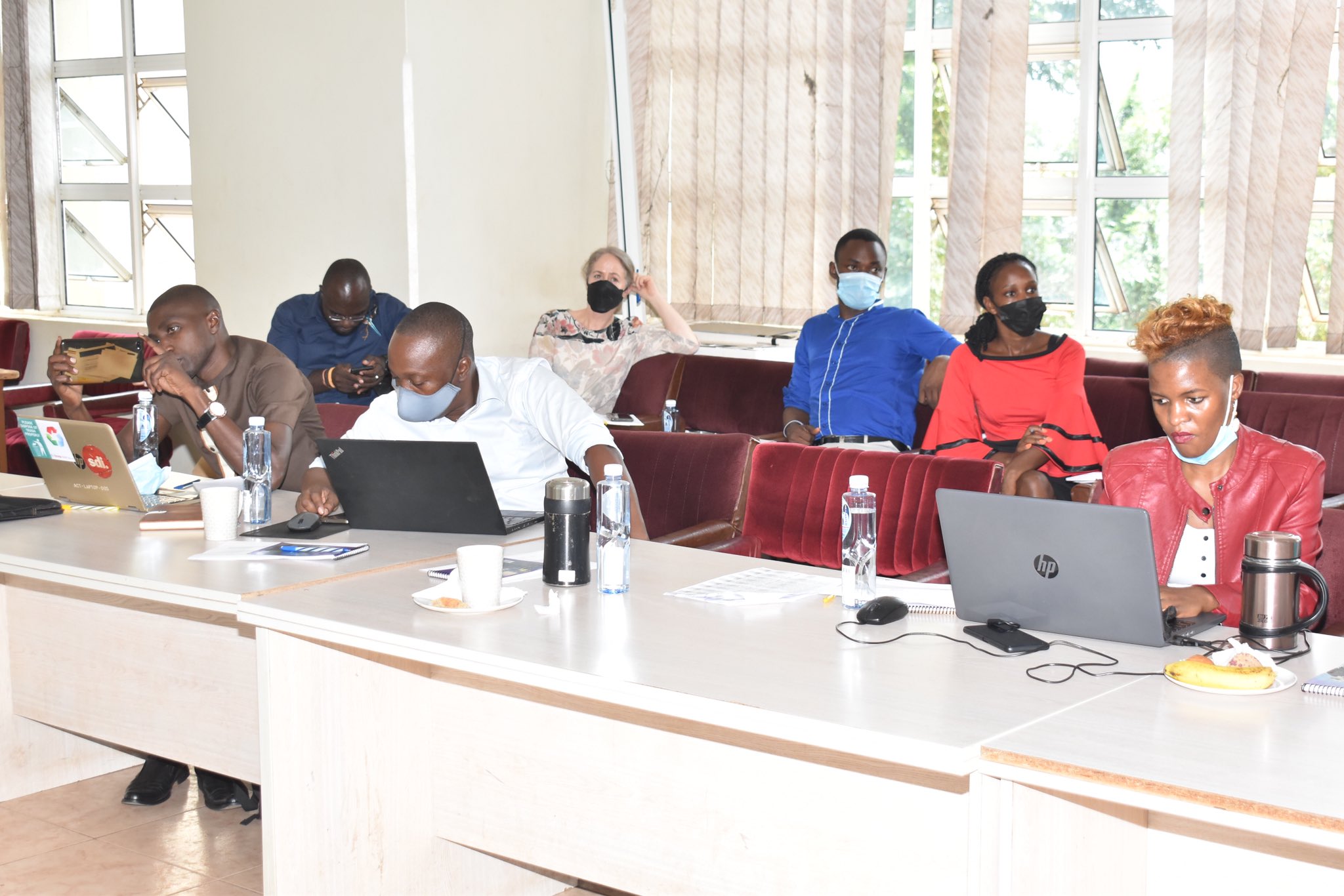
Globally, economies and societal sectors have been negatively affected by COVID-19 pandemic and its associated containment measures. In Uganda, lockdowns were put in place especially in Kampala as a way of containing spreader events. Makerere University represented by the Urban Action Lab in the Department of Geography, Geo-Informatics and Climatic Sciences, College of Agricultural and Environmental Sciences (CAES), in collaboration with the University of Manchester Global Development Institute and ACTTOGETHER-Uganda undertook a study titled: “Covid-19 Effects, Experiences and Responses in Informal Settlements and Commercial Zones of Kampala-Uganda”. The results of the study were presented by the team members during the International Symposium on Covid-19 Effects, Experiences and Responses in Informal Settlements and Commercial Zones of Kampala-Uganda held on 15th March 2022 at the College of Computing and Information Sciences’ Conference Room. The project was guided by three (3) main objectives including: (1) Understanding how the COVID-19 measures have amplified health, economic, occupational, and social risks, (2) Understanding the impact of lockdown measures with the increasing cases of COVID-19 infections, and (3) Exploring the experiences and consequences of the enforcement of measures in public places, the governance of these measures, the partnerships, and power-related tensions. The study analyzed collaborative coalitions that emerged as a response to handling the COVID-19 crisis in Kampala city.
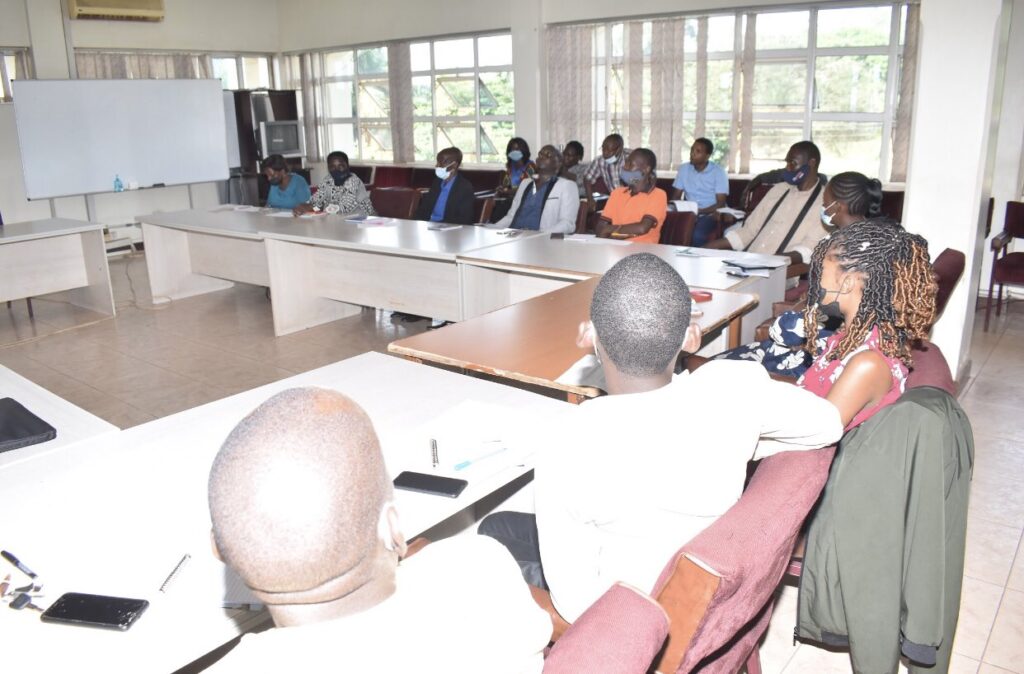
Issues Arising from the Symposium
1. The COVID-19 pandemic amplified the underlying urban planning and development inadequacies, mainly in the informal sector. It escalated challenges to food systems, WASH services, energy, transport, livelihood, and businesses enterprises, and heightened health risks and exposure to COVID-19. This was because the majority of the labourforce had to work from home which Increased psychological stress as a result of prolonged shutdowns, partial lockdowns, curfew, and restrictions to specific business establishments. According to Mr. Sseviiri Hakim from ACTTOGETHER, the pandemic negatively impacted Kampala informal settlements – the State measures were inadequate and collective action worked but still lacked.
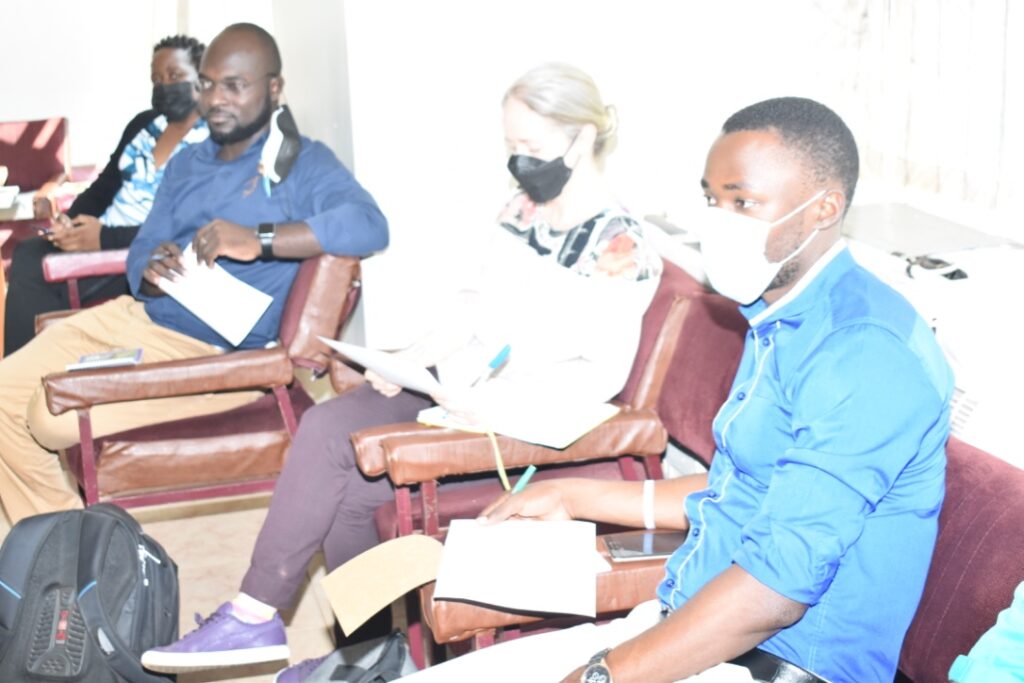
2. Makerere University College of Agricultural and Environmental Sciences’ researchers led by Dr. Paul Mukwaya discovered that it was impossible and financially unmanageable to implement comprehensive rescue packages in urban areas during the pandemic. Lockdowns and physical distancing were highly impractical for densely populated settlements and informal enterprises.
3. Kampala City is characterized by a rapidly growing population, with low-income settlements, mixed land uses and limited planning. The industrial sector is estimated at 80% with 60% GDP and the informal sector businesses at 90% with trade at 72%, manufacturing at 23% and services at only 6%. The rate of urbanization in Kampala has outpaced infrastructure investment and expansion capacity with under-serviced Informal settlements characterized by stretched education and healthcare systems. Private sector clinics and drug shops majorly dominate the health domain with the majority of low-income residents’ accessing health services from clinics and drug shops. The level of health services reflected negatively to the COVID-19 response and containment with few public hospitals and health centres providing health services to mostly the low-income earners.
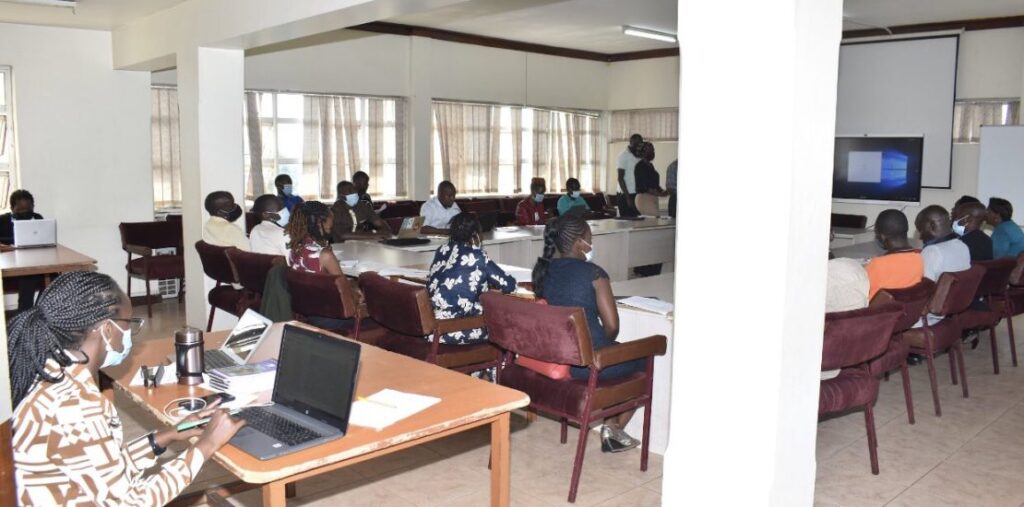
4. Government has done something as far as curbing the spread of COVID-19 is concerned. However there is need for self-assessment among people in order to stop criticizing the government on what it has done and what it has not done. There is need for Government to establish National food stores for food storage during the pandemic. There is also need for government to revisit allocations in the Parish Development Model (PDM) by programming instead of imposing since parishes are fewer compared to the people.
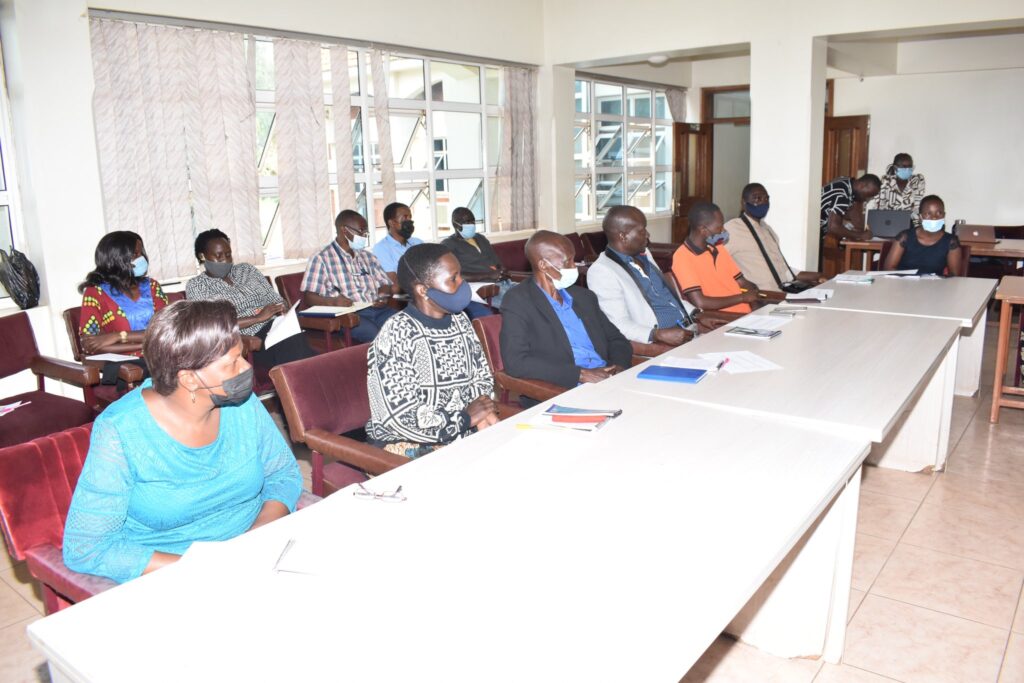
5. In regard to efforts geared towards financial recovery from Covid-19 effects, Mr. Mwanje Nicholas, Kinawataka Zone, urged citizens to opt for financial inclusion especially by saving with Saccos. He encouraged social service pillars aimed at getting data from communities to take care of special interest groups through mindset change and physiological approach.
6. COVID-19 and its measures have globally affected economies. Mr. Ssevviri Hakim noted that the health, economic and social risks were amplified by COVID-19. “There is need to support community-led Initiatives through enhancing the capacity of existing structures. Communities need to work together as well as learn to acknowledge the contribution of others in the fight against the pandemic.
7. According to Mr. Lubega Idiris, vendors were allowed to sleep in markets during the pandemic but the markets barely had the necessary structures. Mr. Lubega urged Government to facilitate the pro-activeness of local level coalitions through provision of accurate information, resources in form of finance and equipment, building synergies for transformational actions and collaborations
8. Mr. Kasaija Peter, a PhD student in the Department of Geography, Geo-Informatics and Climatic Sciences encouraged the team to put in place an engagement system were researchers can engage with different stakeholders in order to ensure continuous growth of communities even after the COVID-19 pandemic.
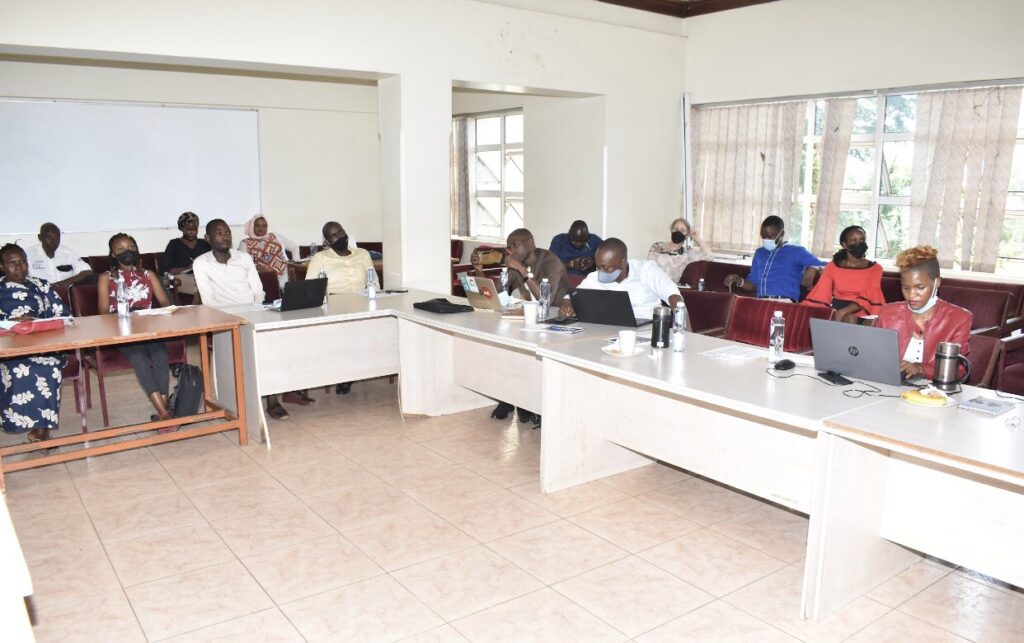
Approach and Methods
The project team applied Participatory research approach with mixed methods- (Academia, ACTogether, NSDFU, local administrative structure); Focus group discussions (FGDs), (30 FGDs- informal business enterprises, settlement residents, local leaders, COVID-19 taskforce or team members, transport operators, and social service providers) and Key informant interviews (KIIs)- CSOs, KCCA technocrats and politicians, Document reviews, and Videography.
COVID-19 Trends and Implementation Taskforce
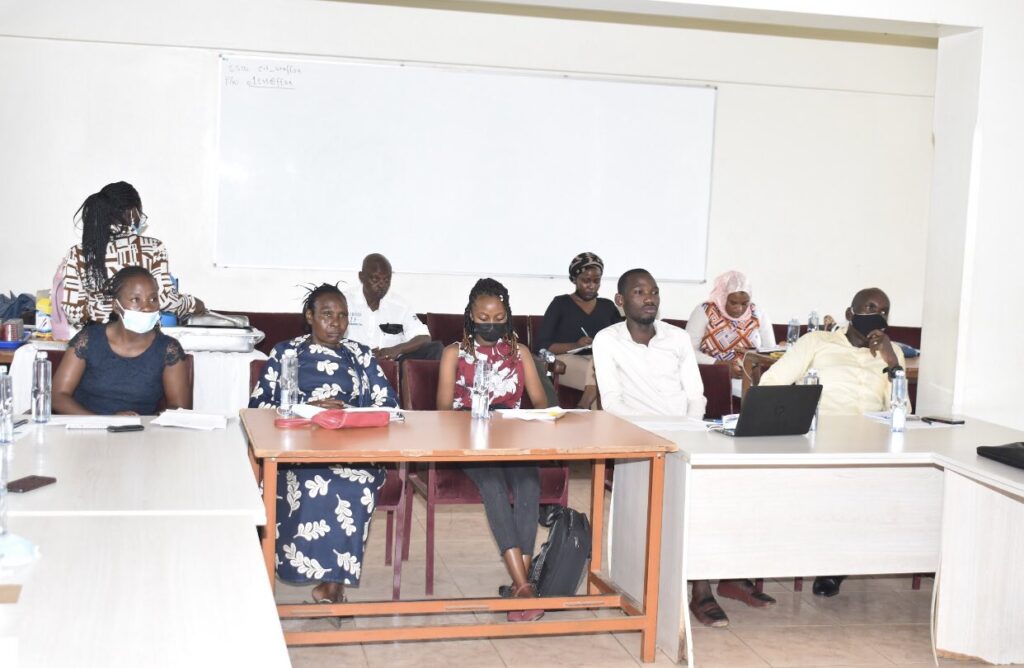
The first COVID-19 case was identified on 21st March 2020 in Uganda. COVID-19 cases went on increasing from 52 cases in April 2020 to 123,742 cases by October 2021 and 98% of these were through local transmissions and only 2% of the cases were imported, with 3,161 deaths registered in the country. The country had two prolonged total lockdowns, with selective lockdowns in the education sector for over 16 months. 24.5% of the population in the central business district was highly vulnerable (shopping malls, transactional offices and transport hubs), with 47.3% moderately vulnerable and 38.2% having the lowest level of vulnerability.
The city and division taskforce against COVID-19 were coordinated by KCCA, with support from the ministry of Health, private sector and several development partners including AMREF and URCS. These enforced the presidential directive, set up divisional rapid response surveillance teams, dedicated 90% of the city’s centres to covid-19 emergencies, provided hand washing and hygiene facilities, built capacity of VHT’s, did community sensitization etc. VHT’s provided first aid, raised awareness and direct links to emergency response services through toll free communication channels. Tracked, reported and facilitated the evacuation of suspected cases.
COVID-19 Response and Social protection
Government rolled out a food distribution programme in early April 2020 were families were given 6 Kgs of maize flour and 3 Kgs of beans per household. However, 75% to 95% of the residents in their respective settlements received food relief from government. The Food distribution mechanism had Irregularities including: supply of substandard and less nutritious foods to vulnerable populations; High and middle-income households given food relief in contrast to the targeted low-income household; Alienation of opposition supporting households; No accountability to all food kinds donated to the NTF. Government also distributed facemasks to help curb the spread of COVID-19 pandemic. However the facemasks were of poor quality and of small sizes. Regarding the promise of economic recovery packages through UDB, there were no clarifications on how the informal sector could access such funds. Government also launched a cash transfer initiative during the second wave of the pandemic i.e., (UGX. 100,000 or USD 27.7) but less than 50 households received cash in a parish.
COVID-19 Socio-Economic and Health Impacts
The pandemic amplified urban inequalities and chronic poverty due to job loss and wage reduction. Livelihoods changed due to increased food and energy prices and closure of Informal businesses. The pandemic also increased the exposure of food selling vendors to the risk of arrest and confiscation of their goods on city streets. There was widespread food insecurity which forced families to reschedule feeding patterns, the quality of food eaten, dietary intake and number of times eaten in a day.
During the first and second phases of lockdown, there was restriction in public transport. The lockdowns and suspension of public transport services disrupted access to healthcare. The bans on public transport led to the spike in the cost of access to healthcare. This was worsened by the incapability of Uganda’s health services to adequately respond to the crisis with many public hospitals lacking enough equipment.
Landlords were reluctant to provide toilet-emptying services and female headed households and youths were unable to pay for water and sanitation facilities which increased the rate of open defecation by residents. During the pandemic, there was improved hygienic conditions due to increased adherence to hand washing and hand sanitization.
Recommendations for addressing future related Pandemics
- There is need to harness the local intelligence of communities to address the long-term challenges faced by slum dwellers.
- There is also need to coordinate communication, planning, decision-making, and operations across a wide range of stakeholders in cities for future response.
- Government should engage: Civic groups, CSOs, local leaders, cultural and religious institutions in case of crisis because they are key in mobilizing and gaining trust in the community and are much trusted by residents than government messaging and policies.
- Coordination mechanisms for targeted responses should be put in place and flexibly changed based on prevailing contexts and a full communication cycle should be embraced and implemented.
- Strong partnerships are key to unlock the potential benefits of collaboration between these complementary people-centered approaches.
- Identifying and supporting community-led solutions for bringing the outbreak under control facilitates people’s active participation in the response.
You may like
-


Makerere Launches Scholarly Guide, Calls for Increased Research, Publication and Innovation in Africa
-
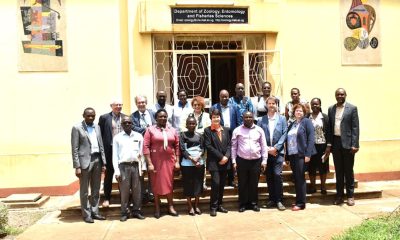

BOKU University Charts New Collaboration Strategies with Mak’s Department of Zoology, Entomology & Fisheries Sciences
-


When Birth Becomes the Most Dangerous Moment, Wanduru & the Work of Making Labour Safer
-
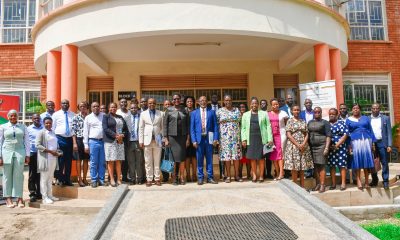

VC Opens Training for MoKCC Officials on Safeguards in Procurement
-


Study Alert: Power in Her Hands; Why Self-Injectable Contraception May Be a Game Changer for Women’s Agency in Uganda
-


For Youth by Youth – Call for Second Cohort Applications
Agriculture & Environment
From Adversity to Excellence: The Inspiring Journey of Makerere’s Best Science Student, Esther Ziribaggwa
Published
1 week agoon
February 6, 2026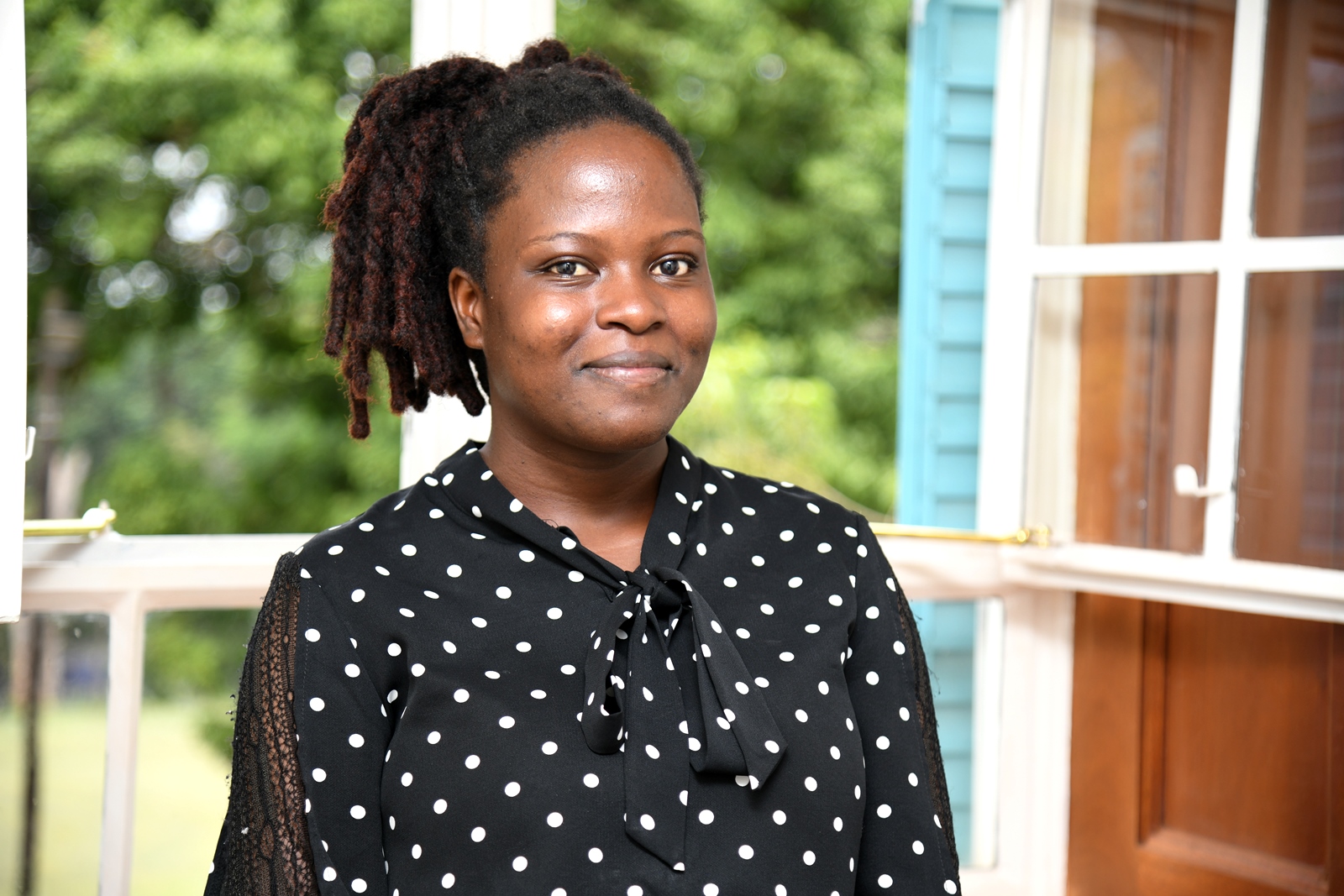
Growing up in Nkonge Village, Kyampisi Sub County in Mukono District, Esther Ziribaggwa learned early the meaning of resilience.
Born to Mr. Musisi Godfrey, a farmer, and Ms. Babirye Resty, a market vendor in Seeta, Mukono District, her journey from humble beginnings to becoming Makerere University’s top-performing student in the Sciences is a testament to her determination, hard work, and unwavering faith. She attained a CGPA of 4.77 in the Bachelor of Agricultural and Rural Innovation, a programme taught at the College of Agricultural and Environmental Sciences (CAES). She will be graduating from Makerere University on 24th February 2026, the first day of the 76th graduation ceremony.
Educational Journey and Navigating the Financial Hurdles to remain in School
Ziribaggwa’s journey to academic excellence has not been smooth. But her parents’ sacrifices laid the foundation for her dreams, even as life presented relentless challenges.
She began her education at Frobel Day and Boarding Primary School and later joined Seeta Boarding Primary School, where she excelled with 9 aggregates in her Primary Leaving Examinations. However, the transition to secondary school presented challenges that tested her resolve.
She joined Mpoma Royal College in Mukono District alongside her sister, who had scored 12 aggregates. Shortly after starting Senior One, their father fell seriously ill, requiring an intestinal surgery, and could not continue to work. With the family unable to pay school fees, both sisters dropped out for a year. It was only through the compassion of the school bursar and the then Head Teacher, Ms. Namazzi Connie, who reduced their fees from 800,000 to 380,000 Uganda Shillings, that Ziribaggwa and her sister were able to return. “The year out of school was a huge setback,” she recalls, “but I focused on catching up. I knew I couldn’t waste this second chance.” Her perseverance paid off. Despite the lost year, she completed her O’ Level with 25 aggregates in eight subjects.
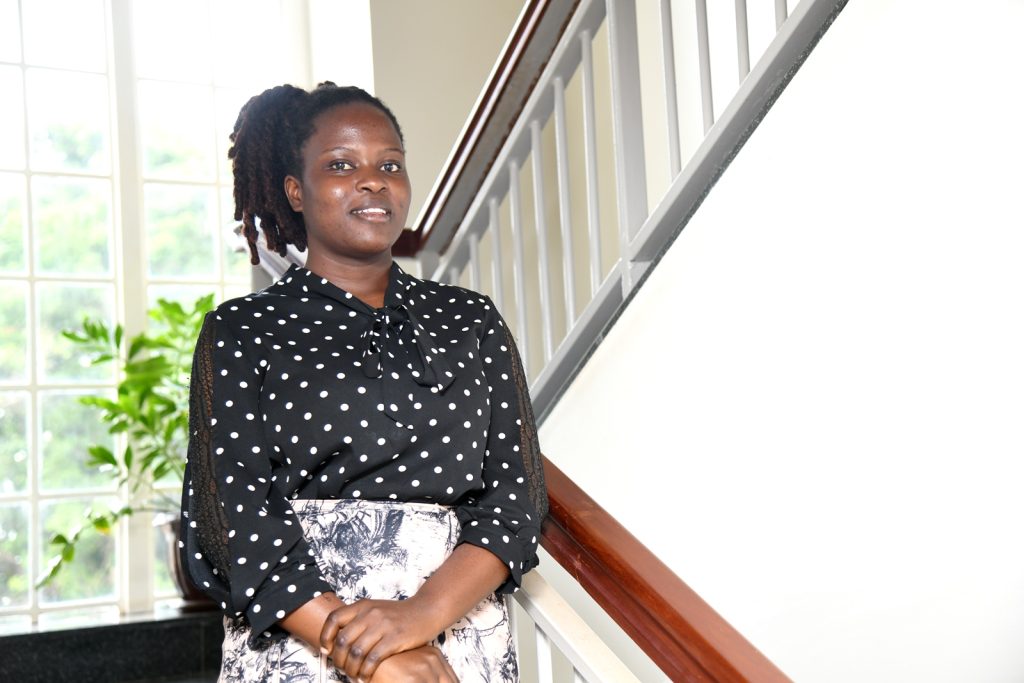
Her A’ Level years were marked by similar challenges. Due to financial constraints, Ziribaggwa attended three different schools. She initially enrolled at Seat of Wisdom Boarding School in Kayunga but was forced to leave when her family could no longer afford the fees. At the time, her father, the family’s sole breadwinner, had undergone a second operation and was unable to work. Her mother, a market vendor, stepped in to support her education and transferred her to Paul Mukasa Day and Boarding Secondary School in Mukono District as a day student. However, the long daily commute was exhausting, leading to a final transfer to Godmark High School in Mukono District where she completed her A’ Level in 2019 with 15 points in Geography, Economics, Agriculture, and Subsidiary Mathematics.
After completing secondary school, Ziribaggwa waited two years before joining university due to financial constraints. Although she had been admitted under the private sponsorship scheme to pursue a Bachelor of Statistics, she was unable to raise the required tuition. Following the outbreak of COVID-19 and the subsequent lockdown, an opportunity arose for her to obtain government sponsorship. At the time, there were no Senior Six leavers, prompting Makerere University to invite applications from candidates who had completed Senior Six within a specified period. The cut-off points across programmes were lowered, enabling her to secure government sponsorship to pursue a Bachelor of Agricultural and Rural Innovation.
Appreciation
She is deeply grateful to the Almighty, her parents, and everyone who supported her educational journey. She is specifically thankful to the Government of Uganda for sponsoring her university education, and to Ms. Namazzi Connie, her O-Level Head Teacher, for subsidizing her school fees. She is also grateful to all her lecturers at CAES and Jesus is King Ministry under the Makerere University Christian Union.
Message of Resilience to Fellow Students
To the students navigating similar challenges, Ziribaggwa shares a message of encouragement. “Never let your situation break you. There’s always going to be challenges, sometimes pushing you to what feels like a point of no return. But those moments should not define your future – they are a test of your resilience. Strive to outgrow them and become a better person, even when the journey feels impossible.”
Career and Aspirations
Ziribaggwa currently works in the extension division of Slow Food Uganda, an agricultural organization based in Mukono District, where her work focuses on women and youth. Although her dream was to become a medical doctor, her love for agriculture has grown over time and does not regret taking on this path. She aspires to become a Senior Agricultural Officer in the country, with the goal of improving farming conditions, particularly in the rural communities. Growing up in a farming community exposed her to many challenges faced by farmers, including unpredictable weather conditions that necessitate irrigation support, and improper use of agrochemical inputs, which pose risks to both soil quality and human health.
Ziribaggwa hopes to pursue further studies in crop and soil science. She draws inspiration from exemplary leaders like Hon. Rebecca Kadaga, former Speaker of the Parliament of Uganda, and First Deputy Prime Minister and Minister for East African Community Affairs. “I have always admired her for being hardworking, resilient, and eloquent,” she says, seeking to emulate these qualities in her own journey.
Agriculture & Environment
Call for Applications: QCF Postdoctoral Research Fellowships
Published
4 weeks agoon
January 20, 2026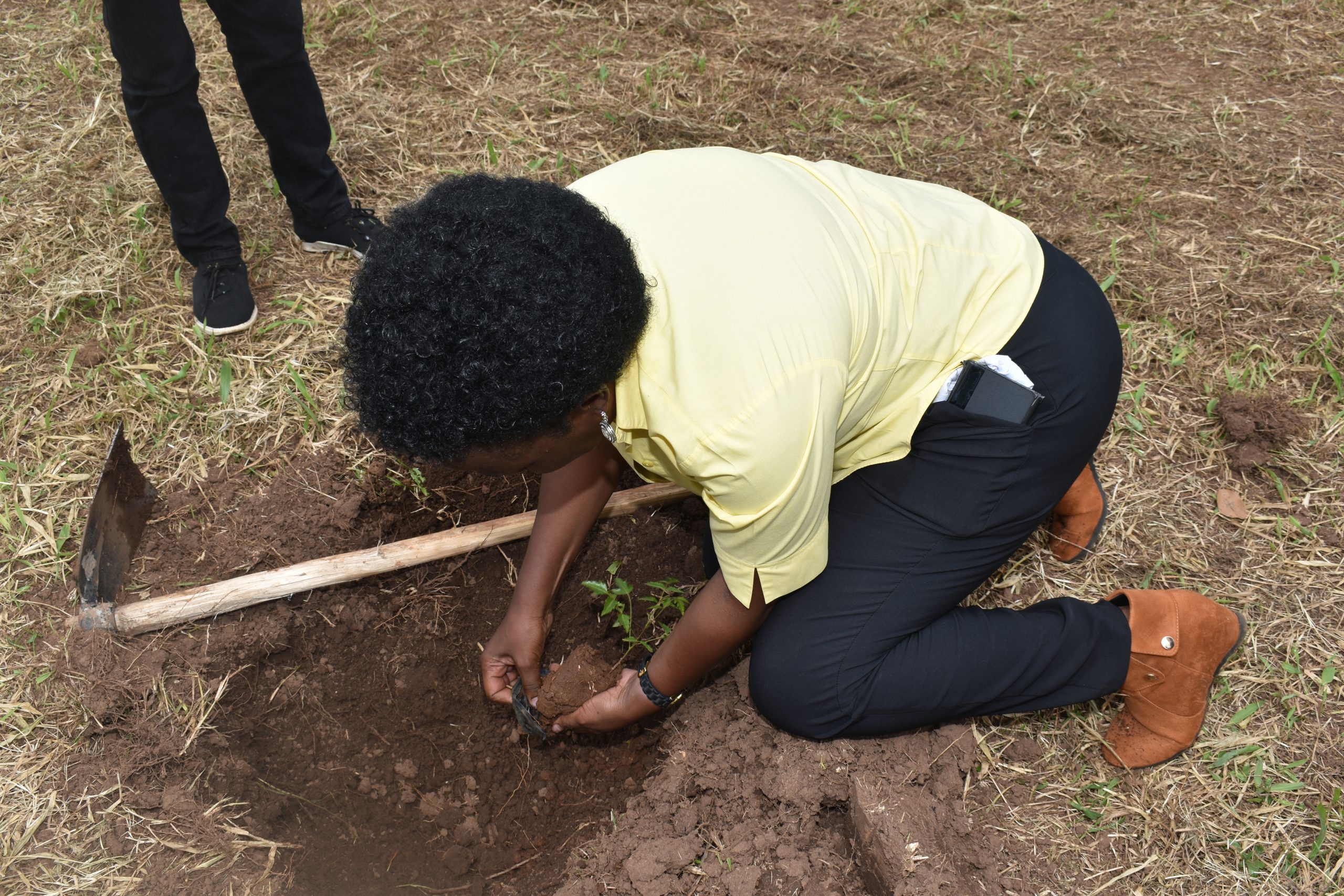
Makerere University’s Department of Geography, Geo-informatics and Climatic Sciences in partnership with Quadrature Climate Foundation and Red Cross Red Crescent Climate Centre are seeking two fellows for Quadrature Climate Foundation (QCF) Fellowship Programme. This is a two-year post-doctoral programme fully funded by QCF, which is an independent charitable foundation working for a greener and fairer future. Applications for the two-year post-doctoral fellowship are invited from individuals with demonstrated interest and expertise in locally led adaptation to climate change research. This initiative is a unique and excellent opportunity to expand the network of interested individuals with researchers and decision-makers, as well as deliver action-oriented research to inform policy and practice. Depending on their interest, each applicant should choose one of the two thematic areas offered under the fellowship program:
- Knowledge co-creation for locally led adaptation to climate change
- Decentralised decision making for effective climate change adaptation and resilience
The Fellow working on the Thematic Area 1: knowledge co-creation for locally adaptation will explore collaborative learning processes (including informal learning) for climate change adaptation among smallholder farmers with focus on Uganda, with linkages to related work in Bangladesh, Mozambique and Nepal. The overall intention is to generate understanding of how decision making processes, across scales, can be linked to local and context specific knowledge systems and process for epistemic just adaptation. The key research questions are:
- What does the process of co-creating knowledge for locally led climate change adaptation look like in a rural smallholder farming setting of a Least Developed Country (LDC)?
- What are the possibilities, promises and pitfalls of knowledge co-creation for locally led adaptation planning?
The research will intentionally contribute to methodological and practice advances in co-creation of knowledge for locally led climate change adaptation.
The research on Thematic Area 2: decentralised decision making for effective adaptation and resilience will undertake scientific interrogation of a climate finance mechanism that has been designed for locally led adaptation and resilience in Uganda. The Fellow will largely focus on testing selected assumptions behind the design of the mechanism. The key questions are:
- How does effective locally led climate change adaptation and resilience building investment decision making look like in practice?
- What works and how does it work? What does not work and why?
Key considerations in the research will include local leadership, inclusion, context specificity, cross-scale, and capability strengthening. The targeted contributions of the fellowship include improved knowledge management for climate resilience planning and decision-making, strengthened evidence-based research-policy-practice dialogues, framework(s) for integrating local and experiential knowledges in resilience building investment decision making processes, among others.
The Fellows will be based, full-time, at Makerere University, Kampala as a core member of the team working on locally led adaptation and resilience. Their work will be conducted under the auspices of the Least Developed Countries Universities Consortium on Climate Change (LUCCC) through which Makerere University is engaged in research and knowledge management collaborations. The Fellowships will focus on Uganda, but with deliberate linkages across LDCs, which might necessitate travels for in-person working meetings.
Roles and responsibilities of the Postdoctoral Research Fellow
The Fellow will be highly motivated to work with a transdisciplinary research team, grow their research expertise, engage with climate change researchers, decision-makers, practitioners and generate different categories of publications. Makerere University will appoint a locally based mentor to the Fellow to provide professional development support. Where needed, the Fellow will participate in teaching and community outreach activities including knowledge sharing in ways that foster collaborative research for adaptation policy and practice.
Requirements:
- A PhD, awarded within the previous three years, in a related discipline (e.g., geography, climate and society, sustainability, adaptation governance, epistemic justice, climate finance).
- Knowledge and experience of locally led adaptation in the agriculture sector.
- Experience in synthesizing and managing datasets and literature.
- Experience in, and knowledgeable of, participatory and collaborative action-oriented research methodologies and tools.
- Demonstrated ability to produce research information products for different audiences.
- Excellent written and verbal communication skills in English
- Demonstrated interest and experience in transdisciplinary collaborations across-scales including with local communities, decision-makers and practitioners in LDCs
- Experience in giving international oral presentations and interest in public communication for wide-ranging categories of audiences
- Data and information visualisation skills will be an added advantage
Application requirements:
Applicants should submit a single PDF with: (i) an application letter not longer than 2 pages that includes indication of theme of interest, a description of research interests, research expertise, and an explanation of how they can work as part of the transdisciplinary research team in line with the fellowship objectives described above; (ii) a CV including a publication list; (iii) copies of academic transcripts and/or certificates; (iv) an example of written work; (v) email addresses of two references who have been directly involved in their PhD research.
Applicants must submit the PDF application document to colocal.caes@mak.ac.ug. Please type “LUCCC PDR Application: COLOCAL-Makerere” as the subject line of the email.
Closing date
Midnight (GMT+3) on 27th February, 2026 or until the position is filled.
Selection process
Eligible and complete applications will be considered followed by communication with short-listed applicants. Makerere University, in consultation with Quadrature Climate Foundation and the Red Cross Red Crescent Climate Centre, will conduct interviews of the short-listed applicants.
If you have not heard from Makerere University within two months of the deadline, please assume your application has been unsuccessful.
Contact details for enquiries about this post-doc fellowship: colocal.caes@mak.ac.ug
Makerere University reserves the right to
- Disqualify ineligible, incomplete and/or inappropriate applications;
- Change the conditions of the award or to make no awards at all
-The QCF Fellowship Programme is a two-year, post-doctoral programme fully funded by Quadrature Climate Foundation (QCF).
-Quadrature Climate Foundation is an independent charitable foundation working for a greener and fairer future. For more information on QCF, please visit qc.foundation.
Agriculture & Environment
Mak-CAES Trains Small-Scale Processors on Soybean Value Addition & Product Development
Published
2 months agoon
December 16, 2025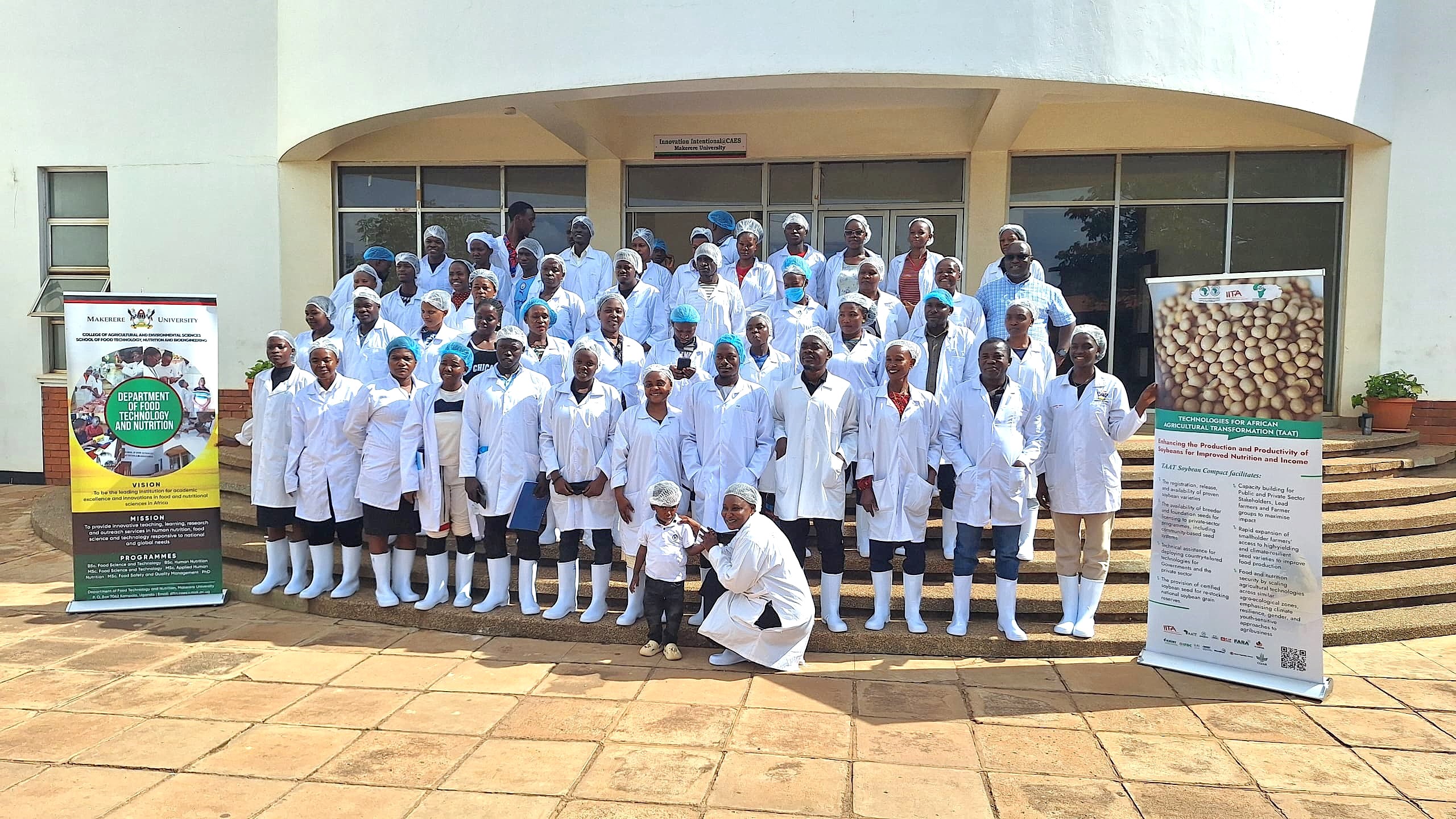
The Department of Food Technology and Nutrition (DFTN), Makerere University, in collaboration with Smart Foods Uganda Ltd, successfully conducted a five-day intensive training on soybean value addition and product development from 24th to 28th November 2025. The training was implemented with support from IITA Uganda under the Training for African Agricultural Transformation (TAAT) Soy Compact Project, aimed at strengthening agro-processing capacities and promoting soybean utilization for improved nutrition and livelihoods.
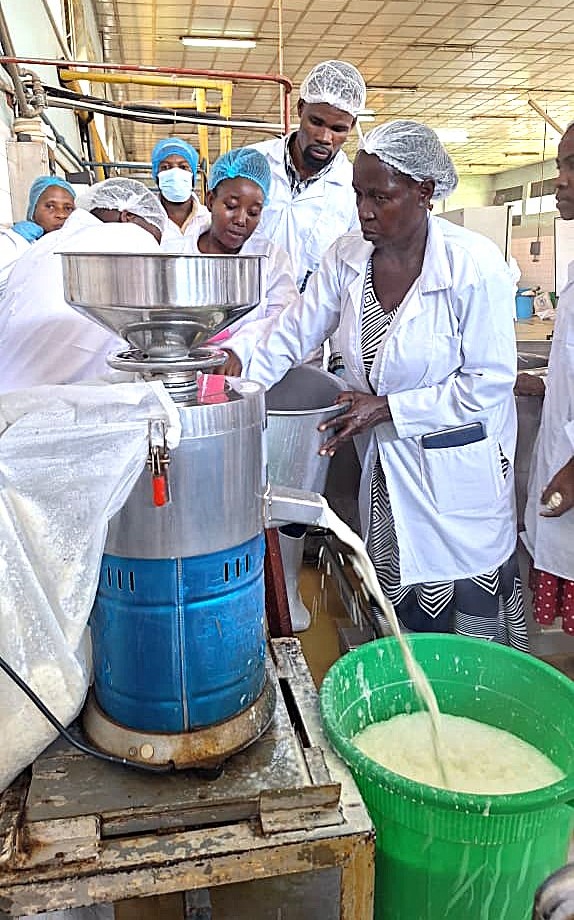
The training program was highly practical and skills-oriented, featuring extensive hands-on sessions designed to equip participants with applicable processing and product development competencies. Most of the practical activities were hosted at Makerere University’s Food Technology and Business Incubation Centre (FTBIC). Participants also benefited from an industry exposure and experiential learning session at Smart Foods Uganda Ltd in Bweyogerere, where they gained first-hand insights into commercial-scale soybean processing operations, quality control systems, and product marketing strategies.

Key thematic areas and technologies covered during the training included soybean nutrition and associated health benefits; assessment of quality attributes of soybeans and soy-based products; application of Good Hygiene Practices (GHP) and Good Manufacturing Practices (GMP); and processing of high-quality soy products. Practical sessions focused on the production of soymilk, tofu, soy yoghurt, soy flour, and soy coffee, as well as the formulation of soy-fortified composite porridge flours. Participants were also trained in the development of various soy-based bakery products, including bread, mandazi, daddies, and baghia. In addition, sessions on marketing, branding and positioning of soy products, as well as UNBS certification requirements and documentation, were conducted to enhance market readiness and regulatory compliance.
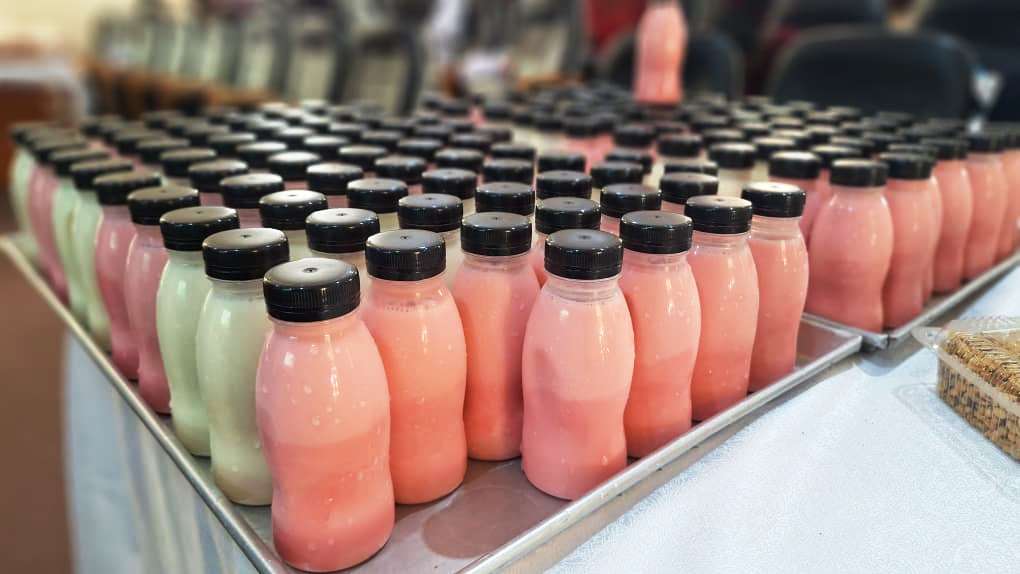
The training attracted a total of 57 participants, comprising small-scale soybean processors and graduating university students, thereby fostering knowledge exchange between academia and industry. Overall, the training contributed significantly to building technical capacity in soybean value addition, promoting entrepreneurship, and supporting the development of nutritious, market-oriented soy-based products in Uganda. The School of Food Technology, Nutrition, and Bioengineering, under the leadership of Dr. Julia Kigozi (Dean), conducts periodical trainings for agro-processors across the country to enhance technical capacity, improve product quality, and promote the adoption of modern, safe, and sustainable food processing practices. These trainings are designed to equip agro-processors with practical skills in food safety, quality assurance, value addition, post-harvest handling, nutrition, and bioengineering innovations, thereby enabling them to meet national and international standards. Through this outreach, the School contributes to strengthening agro-industrial development, reducing post-harvest losses, supporting entrepreneurship, and improving food and nutrition security while fostering stronger linkages between academia, industry, and communities.
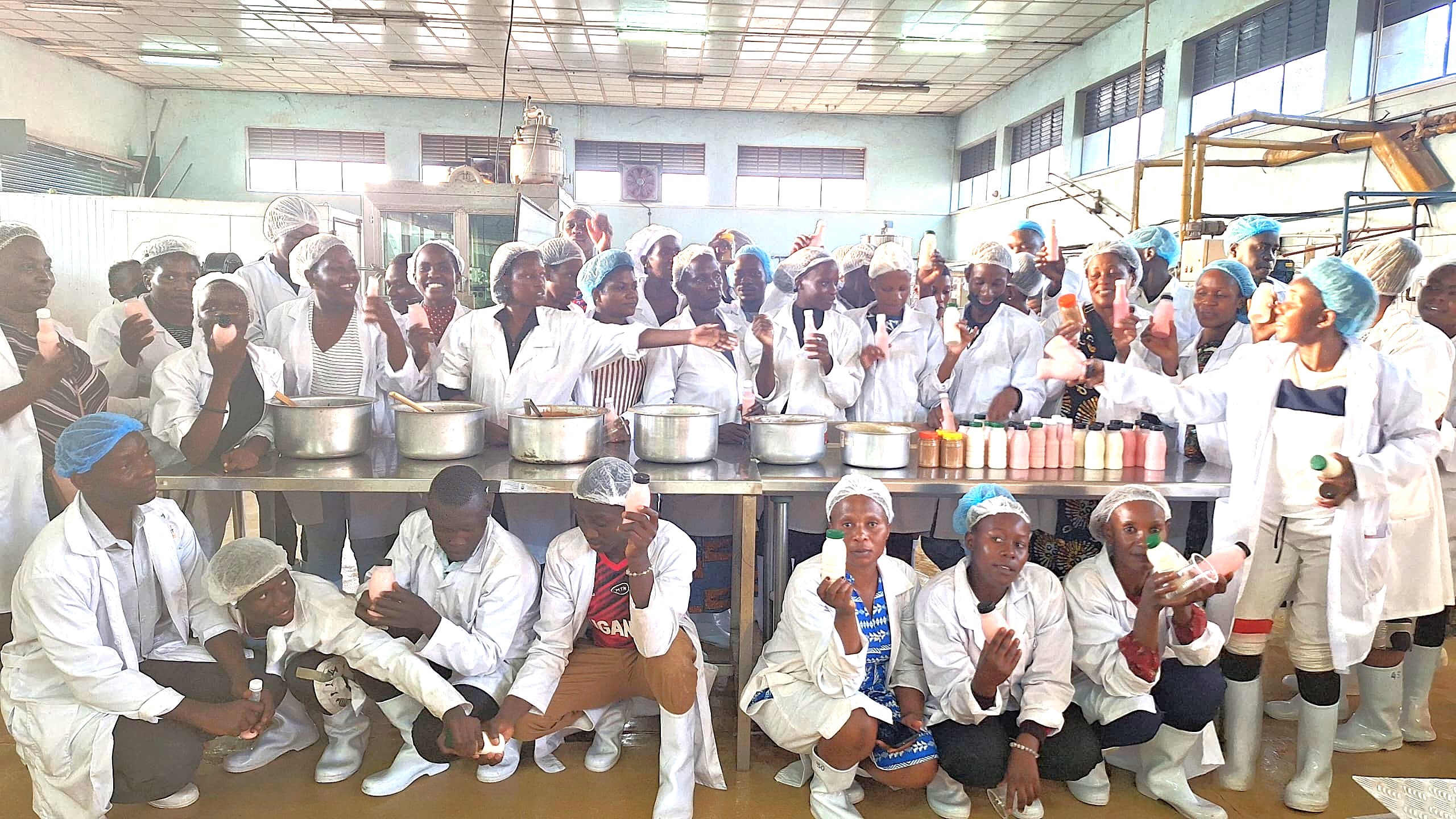
Trending
-

 General2 weeks ago
General2 weeks agoCall for Applications: Admission to Postgraduate Programmes 2026/2027
-

 Natural Sciences2 weeks ago
Natural Sciences2 weeks agoSimon Mungudit: Mak’s Best Performing Male Science Student & Rising Star in Petroleum Geoscience
-

 Agriculture & Environment1 week ago
Agriculture & Environment1 week agoFrom Adversity to Excellence: The Inspiring Journey of Makerere’s Best Science Student, Esther Ziribaggwa
-

 Health2 weeks ago
Health2 weeks agoCall For Applications: MakNCD Masters and PhD Training Opportunities
-

 General6 days ago
General6 days agoAptitude Exam (Paper 1) Results for the Mature Age Entry Scheme 2026/2027
